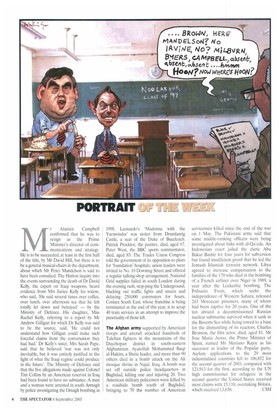M r Alastair Campbell confirmed that he was to resign as
the Prime Minister's director of communications and strategy. He is to be succeeded, at least in the first half of the title, by Mr David Hill, but there is to be a general musical-chairs in the department, about which Mr Peter Mandelson is said to have been consulted. The Hutton inquiry into the events surrounding the death of Dr David Kelly, the expert on Iraqi weapons, heard evidence from Mrs Janice Kelly his widow, who said, 'He said several times over coffee, over lunch, over afternoon tea that he felt totally let down and betrayed' — by the Ministry of Defence. His daughter, Miss Rachel Kelly, referring to a report by Mr Andrew Gilligan for which Dr Kelly was said to be the source, said, 'He could not understand how Gilligan could make such forceful claims from the conversation they had had.' Dr Kelly's sister, Mrs Sarah Pape, said that he believed `war was not only inevitable, but it was entirely justified in the light of what the Iraqi regime could produce in the future'. The Ministry of Defence said that the five allegations made against Colonel Tim Collins by an American reservist in Iraq had been found to have no substance. A man and a woman were arrested in south Armagh by police investigating the Omagh bombing in
1998. Leonardo's 'Madonna with the Yarnwinder' was stolen from Drumlanrig Castle, a seat of the Duke of Buccleuch. Patrick Procktor, the painter, died, aged 67. Peter West, the BBC sports commentator, died, aged 83. The Trades Union Congress told the government of its opposition to plans for 'foundation' hospitals; union leaders were invited to No. 10 Downing Street and offered a regular talking-shop arrangement. National Grid supplies failed in south London during the evening rush, stop-ping the Underground, blacking out traffic lights and streets and delaying 250,000 commuters for hours. Connex South East, whose franchise is being terminated at the end of this year, is to scrap 40 train services in an attempt to improve the punctuality of those left.
The Afghan army supported by American troops and aircraft attacked hundreds of Taleban fighters in the mountains of the Daychopan district in south-eastern Afghanistan. Ayatollah Mohammed Baqr al-Hakim, a Shiite leader, and more than 90 others died in a bomb attack on the Ali mosque shrine in Najaf. Iraq. A bomb was set off outside police headquarters in Baghdad, killing one and injuring 20. Two American military policemen were killed by a roadside bomb south of Baghdad, bringing to 70 the number of American
servicemen killed since the end of the war on 1 May. The Pakistani army said that some middle-ranking officers were being investigated about links with al-Qa'eda. An Indonesian court jailed the cleric Abu Bakar Bashir for four years for subversion but found insufficient proof that he led the Jemaah Islamiah terrorist network. Libya agreed to increase compensation to the families of the 170 who died in the bombing of a French airliner over Niger in 1989, a year after the Lockerbie bombing. The Polisario Front, which seeks the independence of Western Sahara, released 243 Moroccan prisoners, many of whom had been captive for 20 years. One of the ten aboard a decommissioned Russian nuclear submarine survived when it sank in the Barents Sea while being towed to a base for the dismantling of its reactors. Charles Bronson, the film actor, died, aged 81. Mr Jose Maria Aznar, the Prime Minister of Spain, named Mr Mariano Rajoy as his successor as leader of the Popular party. Asylum applications to the 29 most industrialised countries fell to 106,852 for the second quarter of 2003, compared with 121,913 for the first, according to the UN high commissioner for refugees: in the second quarter the United States received most claims with 15,110, overtaking Britain, which received 13,630. CSH










































































 Previous page
Previous page